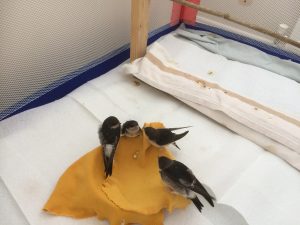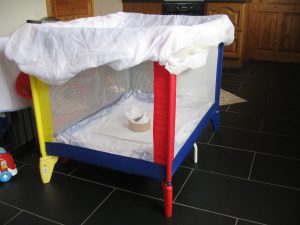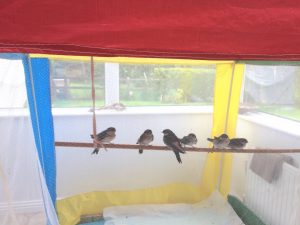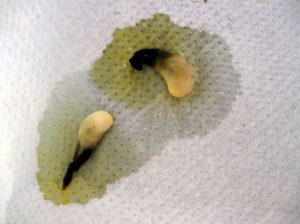
Put the bird(s) in a small bowl in a ventilated box and in a warm, quiet place. Contact a rehabber from our emergency contacts/contact your local wildlife rescue centre or email us at:
contact@
If you can’t make contact with a rehabber follow the help steps below.
The house martin could be confused with the sand martin, swallow or swift. Click on the accompanying images to see that the house martin is predominantly black and white with blue flashings and white hairy legs. The sand martin is probably the most similar and easily confused with, being predominantly brown and white. Both species have short forked tails. The swallow has distinctive long tail feathers and has a red chin. The swift is dull brown , appearing black, with sickle shaped wings.
Compare the nest sites here
Illustrations by © Jonathan Pomroy
Never attempt to see if a bird can fly by throwing them up in the air. If the bird is feathered and old enough to fly, placing it in the open palm of a hand, facing into the wind for a short while, should be enough to tempt a bird that is ready to fly. If it doesn’t, it’s not ready!
Has the nest collapsed?
Have you found live chicks on the ground below?
Carefully pick up the chicks and take them indoors.
Follow steps 1 and 2 above.
Birds from a fallen nest may have suffered injuries, sometimes these will be obvious, but they may
have suffered injuries that are not obvious.
It is always best to get chicks from a fallen nest to a wildlife hospital or experienced and trained
rehabilitator.
Follow the short term care advice whilst making contact with a wildlife hospital or trained
rehabilitator, and whilst arrangements are made to get the bird/s into their care.
Rescue birds are best cared for by a rehabilitator. But until you can find one, below is some short term general care advice. NOTE: house martins are sociable birds so one bird should not be kept on its own and should be taken to a rehabilitator immediately.
Never attempt to see if a bird can fly by throwing them up in the air. If the bird is feathered and old enough to fly, placing it in the open palm of a hand, facing into the wind for a short while, should be enough to tempt a bird that is ready to fly. If it doesn’t, it’s not ready!




If you have a house martin emergency please select your area from the list below to show the available contacts.
We are always working to update our list of rescues and rehabbers, if you are a trained house martin rehabilitator and would like to be added to our list, please get in touch.
House Martin Conservation UK & Ireland are not responsible for the content or views expressed on third party websites.
Ainsworth Wildlife Rescue (Bury, Lancashire)
07923 115668
Email: ainsworthwildliferescue@gmail.com
Facebook
Kinder Bird Rescue (Blackburn, Lancashire)
07305 933065
Facebook
Lower Moss Wood Educational Nature Reserve & Wildlife Hospital (Cheshire)
01565 755082
Facebook
Kendal College Animal Rescue Centre (Cumbria)
01539 814645
Facebook
Wolfwood (Morecambe/Lancaster/South Lakes)
07931 220094
wolfwood.co.uk
Berwick Swan & Wildlife Trust (Northumberland)
01289 302882
wan-trust.org
Facebook
Blyth Wildlife Rescue (Northumberland)
0330 229 17 10
blythwildliferescue.co.uk
Leeds Swifts
07778 768719
startbirding.co.uk
Facebook
Pudz Animal Sanctuary (South Killingholme, North Lincolnshire)
07903 198845
Facebook
Bedlam Farm Wildlife Rescue (Lincolnshire)
07947 916287
Facebook
Cleethorpes Wildlife Rescue (Lincolnshire)
07309 135987
Facebook
Moon & Stars Wildlife Rescue (Lincoln, Lincolnshire)
07736 676636
Facebook
Wild Things Rescue (Lincolnshire)
01526 578579
Facebook
The Wildlife Haven Rescue & Rehabilitation Centre (North Yorkshire)
07772 871833
thewildlifehaven.co.uk
Facebook
Yorkshire Swan & Wildlife Rescue Hospital (North Yorkshire)
07763 424892
ysrh.org.uk
Facebook
Meltham Wildlife Rescue (West Yorks)
07846 344984
melthamwildliferescue.co.uk
Vale Wildlife Hospital & Rehabilitation Centre (Tewkesbury, Gloucestershire)
Animals can be brought straight in, no need to ring.
01386 882288
valewildlife.org.uk
Facebook
Herefordshire Wildlife Rescue
07802 460884
sirenwildliferescue.org
Facebook
Heronfield Small Breeds Farm & Animal Rescue Centre (Knowle)
01564 773406
Facebook
RSPCA Stapely Grange (Nantwich)
0300 1234 999
Email: stapeley@rspca.org.uk
Facebook
rspca.org.uk/local/stapeley-grange-wildlife-centre
Nuneaton & Warwickshire Wildlife Sanctuary
02476 345243
07909 555310
07765 048999
warwickshirewildlifesanctuary.co.uk
Facebook
Cuan Wildlife Rescue (Shropshire)
01952 728070
cuanwildliferescue.org.uk
Facebook
The British Wildlife Rescue Centre (Rugeley, Staffordshire)
01889 271308
thebritishwildliferescuecentre
Facebook
Pet Samaritans Animal Sanctuary (Chesterfield, Derbyshire)
07872 421878
01246 455777
petsamaritans.co.uk
Facebook
Leicestershire Wildlife Hospital (Leicester)
07951 285366
leicestershirewildlifehospital.org.uk
Facebook
Little Souls Wildlife Rescue (Hinkley, Leicestershire)
07899 917387
Facebook
Brinsley Animal Rescue (Nottinghamshire)
01773 712999
brinsleyanimalrescue.org
Facebook
Maldon Wildlife Rescue (Maldon, Essex)
07811 307162
Facebook
South Essex Wildlife Hospital (Orsett, Essex)
01375 893893
southessexwildlife.org
Facebook
Marine & Wildlife Rescue (Great Yarmouth, Norfolk)
01692 650338
marineandwildliferescue.org.uk
Facebook
Runham Wildlife Rescue (Great Yarmouth, Norfolk)
07506 430246
runhamwildliferescue.org
Facebook
East Winch Wildlife Centre (Kings Lynne, Norfolk)
03001 230709
rspca.org.uk/local/east-winch-wildlife-centre
Facebook
Norfolk Wildlife Rescue (Norwich, Norfolk)
07932 844524
norfolk-wildlife-rescue.ueniweb.com
Facebook
PACT Animal Sanctuary (Hingham, Norfolk)
01362 820775
pactsanctuary.org
Facebook
The Wildlife Lounge (Thetford, Norfolk)
07773226963
Facebook
Wildlife Welfare (Stevenage, Hertfordshire)
01438 313526
wildlifewelfare.org.uk
Facebook
Wildlife in Need (Bournemouth, Dorset)
07770 478660
01202 428129
Facebook
Wild Bird Rescue (Dorset)
07719 658751
wildbirdrescuedorset.uk
Facebook
Mousehole Wild Bird Hospital (Mousehole, Cornwall)
01736 731386
mouseholebirdhospital.org.uk
Facebook
West Cornwall Wildlife Rescue & Rehab Volunteers (West Cornwall)
07855 151126
Email: westcornwallwh@gmail.com
westcornwallwildlifevolunteers.wordpress.com
Vale Wildlife Hospital & Rehabilitation Centre (Tewkesbury, Gloucestershire)
Animals can be brought straight in, no need to ring.
01386 882288
valewildlife.org.uk
Facebook
Athena Wildlife & Bird of Prey Centre (Plymouth)
07513 104536
RSPCA Oak & Furrows (Swindon)
01793 640136
Email: info@rspcanorthwilts.org.uk
rspcaoandf.org.uk
Spring Wildlife (Frome, Somerset)
07761 424197
Wildlife & Badger Care (Highbridge, Somerset)
07954 036687
wildlifeandbadgercare.org
Wiltshire Wildlife Hospital (Amesbury, Wiltshire)
07850 778752
wiltshirewildlifehospital.co.uk
Facebook
RSPCA West Hatch Wildlife Centre (Taunton, Somerset)
0300 1230721
rspcawesthatchwildlifecentre
Facebook
Secret World Wildlife Rescue (Highbridge, Somerset)
01278 783250
secretworldwildliferescue
Facebook
Hart Wildlife Rescue (Medstead, Hampshire)
01420 562335
hartwildlife.org.uk
Facebook
East Sussex Wildlife Rescue Ambulance Service (WRAS) (Whitesmith, East Sussex)
07815 078234
wildlifeambulance.org
Facebook
Rogers Wildlife Rescue (Brighton & Hove, East Sussex)
01273 308268
rogerswildliferescue.co.uk
RSPCA Mallydams Wood Wildlife Centre (Fairlight, East Sussex)
0300 123 0723
rspca.org.uk/local/mallydams-wood
Facebook
Swans Wildlife & Nature Patrol Team (London, Greater London)
07976 228307
Facebook
The Wildlife Lodge (Bromley, Greater London)
07983 708497
thewildlifelodge.co.uk
Wildlife Rescue & Ambulance Service (WRAS) Enfield (Barnet, Greater London)
020 8344 2785
wras-enfieldwildlife.org.uk
Facebook
Folly Wildlife Rescue (Tunbridge Wells, Kent)
01892 543213
follywildliferescue.org.uk
Facebook
Willow Wildlife Rescue (Chislehurst, Kent)
07956 472284
willowwildlife.co.uk
Facebook
Oxfordshire Wildlife Rescue (Didcot, Oxfordshire)
07549 322464
Facebook
Little Foxes Wildlife Rescue (Great Haseley, Oxfordshire)
01844 279469
littlefoxes.org.uk
Facebook
Wildlife Aid Foundation (Leatherhead, Surrey)
01372 360404
wildlifeaid.org.uk
Facebook
Brent Lodge Bird & Wildlife Trust (Sidlesham, West Sussex)
01243 641672
brentlodge.org
Facebook
Isle of Wight Wild Bird Rehabilitation – Mr Wally AWOL & Friends (Cowes, Isle of Wight)
07765 564479
iowwbrwallyawol.com
Facebook
Gabo Wildlife (Tonbridge, Kent)
07470 857171
gabowildlife
Facebook
Wildlife Welfare (Stevenage, Hertfordshire)
01438 313526
wildlifewelfare.org
Facebook
Manx Wild Bird Aid (Castletown, Isle of Man)
07624 247666
07624 473582
wildbirdaid.com
Facebook
Guernsey Society of Prevention of Cruelty to Animals – GSPCA (Guernsey, St André-de-la-Pommeray)
01481 257261
07781 104082
gspca.org
Facebook
Flintshire Wildlife & Pet Rescue (Holywell, Flintshire)
01352 712345
Facebook
Gower Bird Hospital (Pennard, Swansea)
01792 371630
gowerbirdhospital.org
Facebook
Tinkers Hill Swan & Bird of Prey Rescue Centre (Amroth, Pembrokeshire)
01834 814397
07771 507915
tinkershill.org
Hessilhead Wildlife Rescue Trust (Lochwinnoch, Renfrewshire)
01505 502415
hessilheadwildlife.org.uk
Facebook
National Wildlife Rescue Centre (Alloa, Clackmannanshire)
03000 999999
scottishspca.org
Facebook
South of Scotland Wildlife Hospital (Dumfries, Dumfries & Galloway)
01387 860461
soswh.co.uk
Facebook
Valley Forge Native Wildlife Rescue (Banchory, Aberdeenshire)
01339 882893
07901 525357
valleyforge.tel
Facebook
The New Arc – North East Wildlife Animal & Rescue Centre (Ellon, Aberdeenshire)
07962 253867
thenewarc.org
Facebook
Blue Highlands Bird Rescue (Brora, Highland Council)
07957 584817
Facebook
Baby Beaks (Kinross, Fife Council)
07718 149814
Babybeaks.org
Facebook
Debbie Doolittle’s Wildlife
02890 825742
Debbie Doolittle’s Wildlife
Facebook
Mary Polizzi
00 44 (0)77 3040 4991
Lynda Huxley
094 9032422
083 4809532
Email: lynda.huxley@icloud.com
Caroline van den Berg
087 4023222
Sophie Hayley (Kell, County Meath)
087 982 8992
Wildlife Rescue Cork (Whitechurch)
Email: wildliferescuecork@hotmail.com
wildliferescuecork.com
Facebook
Katy’s Wildlife Rescue (Sneem)
085 831 2293
Facebook
Roisin Johnson at City Vets
051 371155